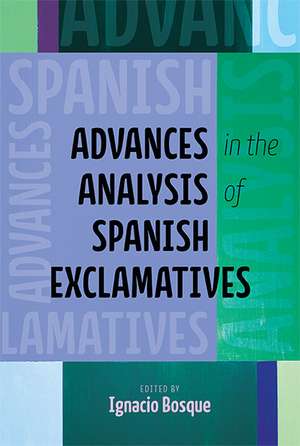Advances in the Analysis of Spanish Exclamatives: Theoretical Developments in Hispanic Lin
Editat de Ignacio Bosqueen Limba Engleză Paperback – 7 feb 2017
Advances in the Analysis of Spanish Exclamatives is the first book entirely devoted to Spanish exclamatives, a special sentence type often overlooked by contemporary linguists and neglected in standard grammatical descriptions. The seven essays in this volume, each by a leading specialist on the topic, scrutinize the syntax—as well as the semantic and pragmatic aspects—of exclamations on theoretical grounds.
The book begins by summarizing, commenting on, and evaluating previous descriptive and theoretical contributions on Spanish exclamatives. This introductory overview also contains a detailed classification of Spanish exclamative grammatical types, along with an analysis of their main properties. Special attention is devoted in the book throughoutto the syntactic structures displayed by exclamative patterns; the differences between exclamations and other speech acts (specifically questions and imperatives); the peculiar semantic denotation of exclamative words and their relationship to quantifiers denoting high degree; the semantics of adjectives and adverbs expressing extreme evaluation; the form and interpretation of negated and embedded exclamatives; the properties of optative utterances; and the different ways in which expressive contents are related to unexpected reactions of the speaker, as well as possible knowledge shared by interlocutors.
This groundbreaking volume provides a complete and accurate picture of Spanish exclamation by integrating its numerous component parts.
The book begins by summarizing, commenting on, and evaluating previous descriptive and theoretical contributions on Spanish exclamatives. This introductory overview also contains a detailed classification of Spanish exclamative grammatical types, along with an analysis of their main properties. Special attention is devoted in the book throughoutto the syntactic structures displayed by exclamative patterns; the differences between exclamations and other speech acts (specifically questions and imperatives); the peculiar semantic denotation of exclamative words and their relationship to quantifiers denoting high degree; the semantics of adjectives and adverbs expressing extreme evaluation; the form and interpretation of negated and embedded exclamatives; the properties of optative utterances; and the different ways in which expressive contents are related to unexpected reactions of the speaker, as well as possible knowledge shared by interlocutors.
This groundbreaking volume provides a complete and accurate picture of Spanish exclamation by integrating its numerous component parts.
Preț: 310.35 lei
Nou
Puncte Express: 466
Preț estimativ în valută:
59.39€ • 62.13$ • 49.33£
59.39€ • 62.13$ • 49.33£
Carte tipărită la comandă
Livrare economică 02-16 aprilie
Preluare comenzi: 021 569.72.76
Specificații
ISBN-13: 9780814253885
ISBN-10: 0814253881
Pagini: 248
Ilustrații: 21 images, 6 tables
Dimensiuni: 152 x 229 x 20 mm
Greutate: 0.37 kg
Ediția:1
Editura: Ohio State University Press
Colecția Ohio State University Press
Seria Theoretical Developments in Hispanic Lin
ISBN-10: 0814253881
Pagini: 248
Ilustrații: 21 images, 6 tables
Dimensiuni: 152 x 229 x 20 mm
Greutate: 0.37 kg
Ediția:1
Editura: Ohio State University Press
Colecția Ohio State University Press
Seria Theoretical Developments in Hispanic Lin
Recenzii
“This book will be an extremely useful tool for researchers on Spanish syntax and semantics, and for all linguists working on sentence types and on the comparative syntax of clause types.” —Brenda Laca, University of Paris 8
“This edited volume is very significant for the field of Spanish exclamatives as well as for the wider theoretical field of syntax, semantics, and pragmatics.” —Melvin González Rivera, University of Puerto Rico–Mayaguez
Notă biografică
Ignacio Bosque is honorary Professor of Spanish Linguistics at Complutense University of Madrid and a full member of the Spanish Royal Academy.



